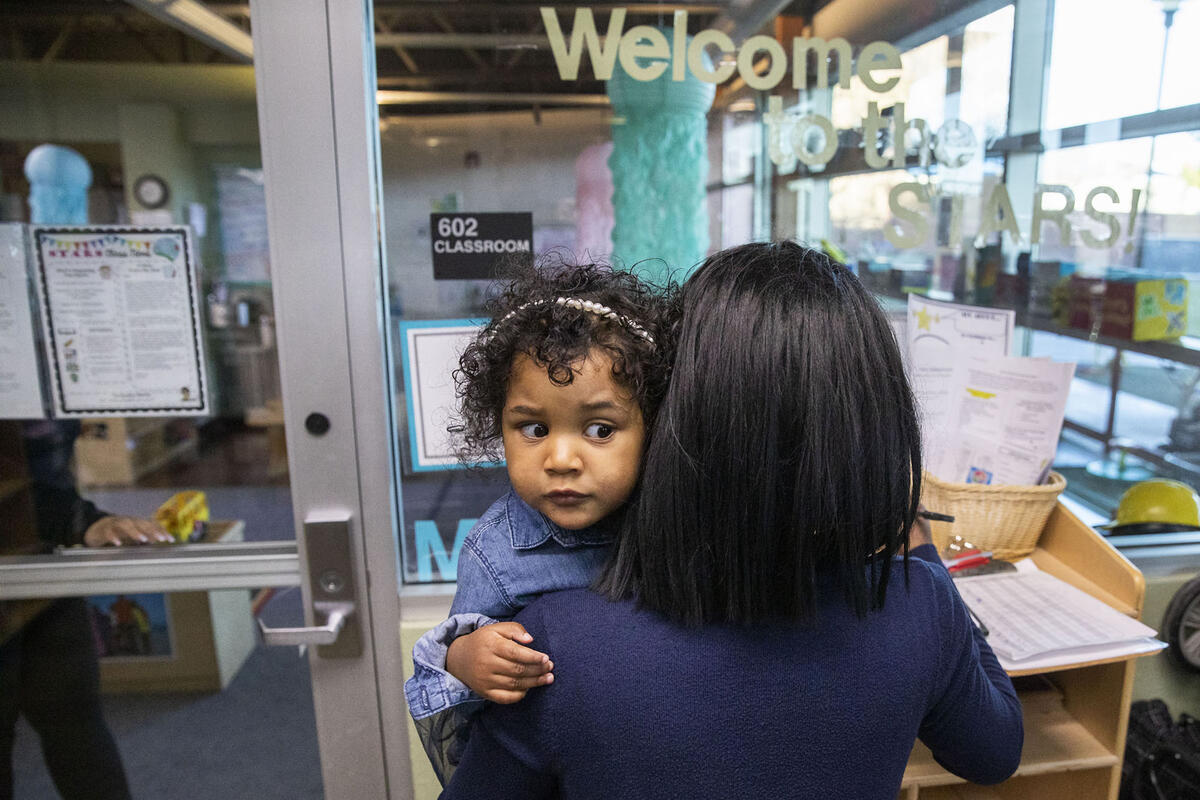Jessica Morales Alvarez is a mom who’s pulled a dozen directions. A full-time clinical substance abuse counselor, mom to a 2-year-old daughter, caretaker to her parents, and a full-time student earning an M.S. in clinical mental health counseling, Morales Alvarez has no time to spare.
As with many UNLV student-parents, the whole family shared child care duties. When she was at work or in class, Morales Alvarez’s mother watched little Zuri-Anahi. She and her husband juggled pick-ups and drop-offs, and her employer allowed her flexibility to shift her schedule to align with her husband’s.
But just as the family settled into a routine, Morales Alvarez noticed the early signs of dementia in her mother. Around the same time, Morales Alvarez’s husband relocated out of the U.S. to care for his mother undergoing cancer treatment.

Suddenly, her all-hands approach to child care was less reliable. She contemplated taking a break from UNLV to focus entirely on work and family demands – a decision many student-parents face during their academic careers.
Then, seemingly out of nowhere, an email arrived announcing the Child Care Access Means Parents in School (CCAMPIS) Grant a federally funded program that covers 90 percent of child care costs for children of UNLV students.
“When I was accepted, I literally screamed,” Morales Alvarez said. “I was at my desk at work, and I was so overcome with emotion because I was just sure I wouldn’t be selected.”
Finding Support
In spring 2022, the first semester for the program at UNLV, 47 children belonging to 37 student-parents received grants. A four-year $1.8 million grant from the U.S. Department of Education funds the CCAMPIS program. It funds 90 percent of child care costs for low-income students enrolled at UNLV. Parents pay 10 percent of child care tuition and child care center registration fees.
“For a long time, our student-parents have told us that finding affordable and accessible child care is a challenge,” said Sunny Gittens, executive director of student engagement. “Even though UNLV has an affordable child care option in the UNLV/CSUN Preschool, it can still cost $8,000 on the low end to well above $10,000 per year for child care.”
That struggle led Gittens to combine forces with preschool center director Claire Tredwell and assistant professor Jenna Weglarz-Ward from the College of Education’s early childhood, multilingual, and special education department to apply for the CCAMPIS funding last year.
Though UNLV doesn’t track the exact number of student-parents, about 640 students claimed dependents on their 2019 Free Application for Federal Student Aid (FAFSA). The CCAMPIS program received 63 grant applications for spring. Of those, 52 met all the eligibility requirements. Though CCAMPIS enrolled most eligible applicants, there are 26 children from 15 families on the waitlist, Gittens said.
Supporting persistence
Like Morales Alvarez, many UNLV student-parents juggle child care through a network of relatives and friends. When that system fails, parents often take breaks from college to focus on their careers and family. Sometimes those breaks result in parents never finishing their degrees.
“We know this program will help students persist, graduate, and get more out of their college experience,” Gittens said. “But we also think there is a multi-generational benefit because so many studies show that early childhood education is beneficial to a child’s long-term development.”
Student-parents may use the grant at the UNLV/CSUN Preschool or the University United Methodist Child Development Center, located on Maryland Parkway across from the main UNLV campus.
Supporting growth
Morales Alvarez says she’s seeing positive changes in her child, who is enrolled at the CSUN program three days a week.
“I can already tell she’s expanding her vocabulary, and the staff is pushing me to be a better parent in really subtle ways,” Morales-Alvarez said. “Minus the tears when I drop her off, it’s been such a relief, and it makes me feel so comfortable.”
In addition to the child care grants, CCAMPIS also supports many wraparound resources, including:
- Virtual networking/community spaces for students to post questions, share advice and resources, and celebrate personal or family achievements
- Virtual and physical spaces for community resources, developmental milestone information, and campus resources for student support
- In-person and virtual sessions focusing information on child development, parenting information, and student success
“Our CCAMPIS program aims to help students gain confidence in their parenting and understand their children's learning and development while helping them develop skills to be successful students as well,” explained Weglarz-Ward, who was a student-parent throughout her higher education experience. “Helping student-parents meet and network provides some of the best support, especially when they are overwhelmed and stressed. It helps to know you’re not alone.”
This semester, the program will host a Family Literacy Night and seminars on handling challenging behavior, time management, and stress relief and mindfulness. These events also provide opportunities for early childhood education students to supplement their classroom learning experiences and collect data to support the research and reporting aspects of the CCAMPIS grant.
“It’s a true win-win for both our students and their children,” noted Tredwell. “We’ll be able to keep more of our students on track to graduate while opening doors to quality early childhood education.”



